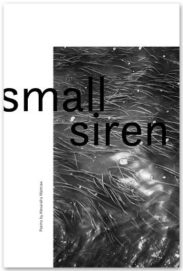 Alexandra Mattraw
Alexandra Mattraw
The Cultural Society ($20)
by Andrew Joron
Sirens, whatever else they may be, are surely communications, soundings to alarm or to allure. The poems in Alexandra Mattraw’s recent collection small siren perform both functions at once, signaling that language—that great bridge between thoughts and things—has begun to sway dangerously yet beautifully, and that its structural stresses are approaching the “yield point” of the sublime.
A “yield point,” we are told in the book’s endnotes, is a term used in structural engineering. Mattraw deploys the term at key places in her text, quoting a nineteenth-century engineering manual: “The yield point refers to the load at which solid material that is being stretched begins to flow or change shape permanently.” It’s not hard to see how this term could apply to poetic making. Moreover, the quoted passage is reminiscent of another nineteenth-century writer’s take on the cultural effect of capitalism: “All that is solid melts into air.”
To us, living in the twenty-first century, the meltdowns of meaning instigated by capitalism’s acceleration of history have become second nature. Traditional practices, and the discourses that support them, are going extinct as rapidly as most animal species. Caught up as we are in the matrix of the media spectacle, we barely notice their disappearance. By now, we have accepted the ways that meaning, right before our eyes, can “flow or change shape permanently.” Thus, writing that represents an existence composed entirely of yield points defines a new brand of realism.
Nonetheless, it is resistance to fluidity that seems to challenge and inspire this poet. The book’s pages are veritable blueprints that take us “inside the construction.” With their frequent mention of “trusses” and “rituals” (the social equivalent of trusses), not to mention their conspicuous deployment of slash marks and colons as structural underpinnings, the poems seek to check and guide the overflows and failures of meaning inherent to poetic language. In a melting reality, the mirage of an enduring pattern emerges as an obscure object of desire. Here, flow and fracture lend themselves not to deconstruction, but instead become the building materials of a new “reconstruction.”
One poem’s title states “You must build a new bridge before demolishing an old one,” implying that meanings must continue to cross the divide (between subject and object, you and I) even while reconstruction takes place.
you collect trusses / always iron X’s climb horizontal
ladders / a crane made of triangles / blue jays confuse
with trees / rare silence
full of itself / river glass
cracks / effortless white tusks / in your error /
measure honest use / four cables hold
In the poem entitled “Truss Brudge,” it’s made clear that linguistic (re)constructions serve as key supports for human interaction. The primacy of the encounter between self and other—another recurring theme in this book—is rendered here in constructivist terms: “Two parts fastened so tight that overloaded, joints produce only direct tension. You, I, and the your between. . . . Truss members are pinned together or their plates are riveted.”
Throughout small siren, the poet at once questions and makes visible the verbal bracework of our relations to others: how even the most effervescent meaning is riveted to mind, how our grammars provide “sway bracing” against the vicissitudes of love and death. There is a cool objectivity, something of an engineer’s measuring gaze, in the poet’s assessments of whether, and how long, the language-bridge between I and thou can endure.
The ever-present threat of structural failure, a sense that life must be conducted within swaying constructions, imbues these lines with tense vibrancy. Suspension bridge as lyre: the poems are tightly strung, the notes plucked carefully by the player.
In the end, however, the cables cannot hold. Following a poem (“Reconstruction: Christchurch, New Zealand”) that describes buildings destroyed by an earthquake, the collection’s last four poems consist of words scattered across the page, as if in the aftermath of a collapse.
Yet, even in dispersal, words create fields of force (syntactic, semantic) between themselves. Such forcefields then provide a foundation for the reconstruction of a space of meaning. The final phrase of the book is cast in the conditional, as an opening of possibility:
a cry
that could have
room
To be free to move, any meaning must be smaller than its own space of possibility. A “cry that could have room,” therefore, must always be a small siren.
